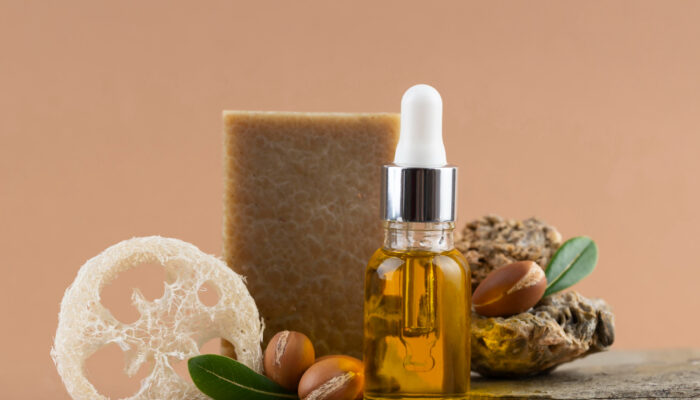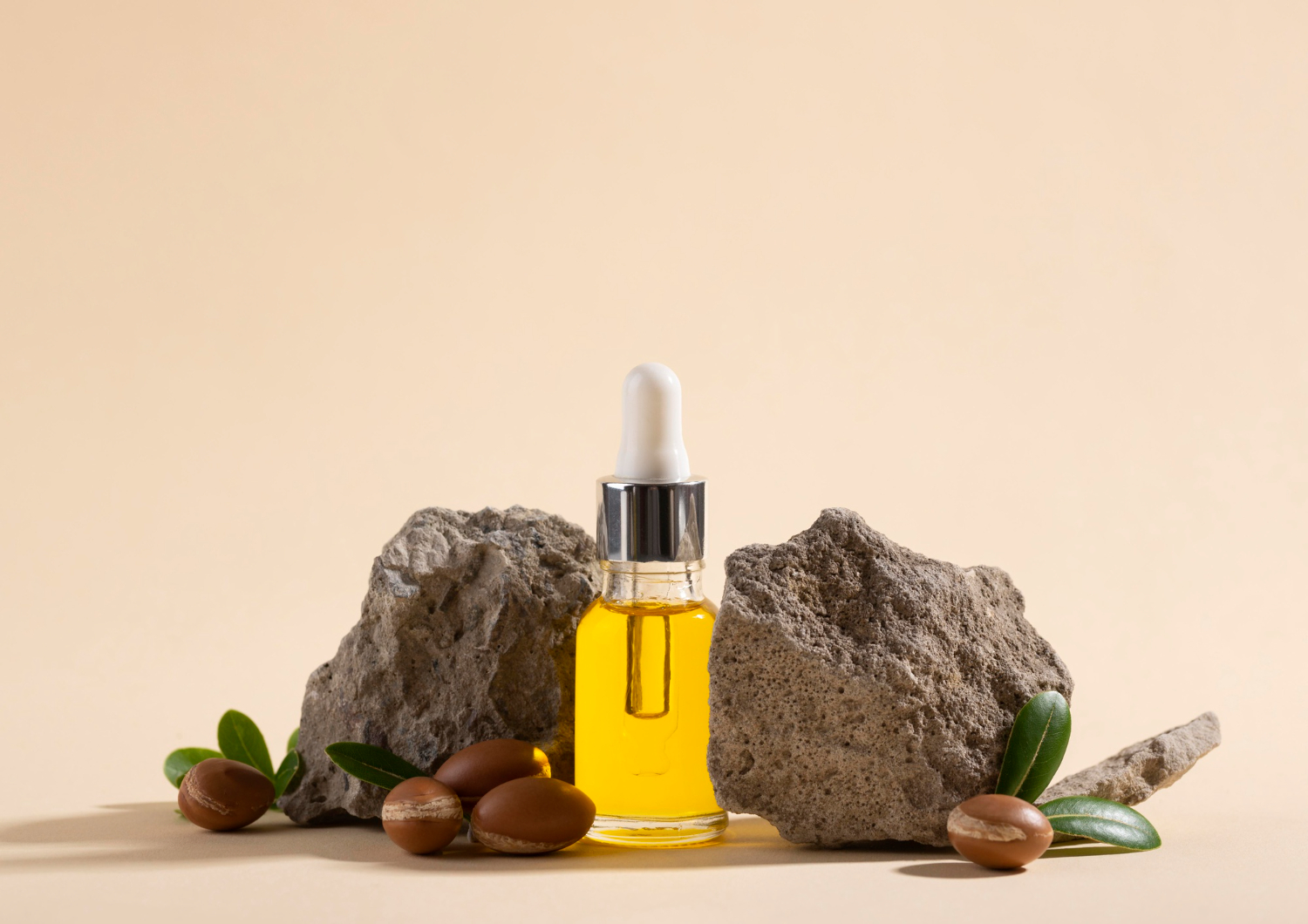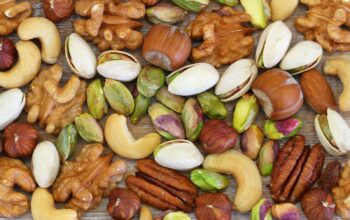Because of its numerous possible health benefits in addition to its delicate, nutty flavor, argan oil has been a culinary mainstay in Morocco for decades.
The kernels of the argan tree’s fruit are the source of this naturally occurring plant oil.
Despite being indigenous to Morocco, argan oil is being utilized in many different culinary, cosmetic, and medical purposes worldwide.

Twelve of the most well-known applications and health advantages of argan oil are covered in this article.
1. Provides Vital Nutrients
Fatty acids and other phenolic compounds make up the majority of the components of argan oil.
Oleic and linoleic acid make up the majority of the fat in argan oil.
Linoleic acid, or omega-6, makes up about 29–36% of the fatty acid content of argan oil, which makes it a strong supply of this important nutrient.
Although it is not necessary, oleic acid accounts for 43–49% of the fatty acid content of argan oil and is a very beneficial fat. Oleic acid, which is also present in olive oil, is well known for its beneficial effects on heart health.
Furthermore, vitamin E, which is necessary for healthy skin, hair, and eyes, is abundant in argan oil. Strong antioxidant qualities are another attribute of this vitamin.
2. Possesses Anti-Inflammatory and Antioxidant Properties
Argan oil’s numerous phenolic components are probably mostly to blame for its anti-inflammatory and antioxidant properties.
Tocopherol, often known as vitamin E, is a fat-soluble vitamin that is abundant in argan oil and works as a strong antioxidant to lessen the harmful effects of free radicals.
Argan oil’s antioxidant potential is additionally influenced by other substances such plant sterols, melatonin, and CoQ10.
In comparison to the control group, a recent study showed a significant decrease in inflammatory markers in mice fed argan oil before they were exposed to a highly inflammatory liver toxin.
Furthermore, some studies suggest that applying argan oil topically to your skin can help lessen inflammation brought on by wounds or infections.
While these findings are promising, more investigation is required to learn how argan oil might be utilized therapeutically to lower oxidative stress and inflammation in humans.
3. Could Improve Heart Health
Oleic acid, an omega-9 monounsaturated lipid, is abundant in argan oil (1Trusted Source).
Additionally found in a number of other foods, such as avocado and olive oils, oleic acid is frequently associated with heart-protective benefits.
According to a tiny human investigation, argan oil and olive oil can both lower the risk of heart disease by influencing blood antioxidant levels.
Higher blood levels of antioxidants and lower levels of “bad” LDL cholesterol were linked in a different small human trial involving argan oil use.
In a research on the risk of heart disease in 40 healthy individuals, those who took 15 grams of argan oil daily for 30 days saw a 20% and 16% decrease in their levels of triglycerides and “bad” LDL cholesterol, respectively.
Larger research are required to fully understand how argan oil may assist human heart health, even if these results are encouraging.
4. Potential Advantages for Diabetes
Argan oil may help prevent diabetes, according to some preliminary animal research.
In mice given a high-sugar diet combined with argan oil, two trials showed a significant decrease in both insulin resistance and fasting blood sugar.
These studies mainly credited the oil’s antioxidant content for these advantages.
These findings do not, however, necessarily suggest that people would have the same outcomes. Human research is therefore required.
5. May Possess Anticancer Properties
Certain cancer cells may grow and reproduce more slowly when exposed to argan oil.
In a test-tube investigation, prostate cancer cells were treated with polyphenolic chemicals derived from argan oil. In comparison to the control group, the extract reduced the development of cancer cells by 50%.
A pharmaceutical-grade combination of vitamin E and argan oil enhanced the rate of cell death on breast and colon cancer cell samples in another test-tube investigation.
Even though this early research is fascinating, additional investigation is required to see if argan oil can be utilized to treat cancer in people.
6. May Diminish Aging Signs on the Skin
The use of argan oil as a component in many skin care products has grown rapidly in popularity.
According to certain studies, eating foods high in argan oil may help prevent oxidative stress and inflammation, which in turn may slow down the aging process.
When used topically, it may also aid in the preservation and restoration of healthy skin, minimizing outward indications of age.
According to certain human research, postmenopausal women’s skin elasticity and moisture can be improved by applying orally swallowed argan oil.
In the end, additional human research is required.
7. Could Heal Certain Skin Issues
For many years, argan oil has been used as a traditional home medicine to relieve inflammatory skin disorders, particularly in North Africa, the home of argan trees.
Argan oil is still widely used to cure particular skin infections, despite the paucity of scientific evidence to back this claim.
Argan oil does, however, appear to treat skin tissue, according to recent research, which also suggests that it contains a number of antioxidant and anti-inflammatory chemicals.
Remember that further study is required.
8. Could Encourage the Healing of Wounds
Argan oil has the potential to quicken the healing of wounds.
Rats administered argan oil twice a day for 14 days on second-degree burns showed a marked improvement in wound healing, according to one animal study.
This evidence suggests a potential role for argan oil in wound healing and tissue repair, even though it doesn’t definitively establish anything.
Nevertheless, human research is necessary.
9. Could Hydrate Hair and Skin
The main fat components of argan oil, oleic and linoleic acids, are essential nutrients for keeping skin and hair healthy.
Although it is frequently applied topically to the skin and hair, argan oil can also be taken internally.
In one study, postmenopausal women’s skin moisture content was increased by applying argan oil topically and orally.
While research on the specific benefits of argan oil for hair health is lacking, other plant oils with similar nutritional profiles may be able to lessen split ends and other forms of hair damage.
10. Frequently Used to Address and Avoid Stretch Marks
Stretch marks can be prevented and minimized with argan oil, although no studies have been done to support this claim.
The truth is that there isn’t any proof to support the idea that topical treatments of any kind can effectively reduce stretch marks.
Argan oil has been shown in studies to help lower inflammation and increase skin suppleness, which may be why so many people have had success using it to treat stretch marks.
11. Occasionally Used to Address Acne
While no significant scientific research has been done to establish the efficacy of argan oil as a cure for acne, several sources make this claim.
Nevertheless, the anti-inflammatory and antioxidant properties of argan oil may help to lessen skin irritation and redness brought on by acne.
Additionally, the oil might help hydrate the skin, which is crucial for preventing acne (18Trusted Source).
The reason behind your acne will probably determine how well argan oil works to treat it. Argan oil might be able to help if you have dry skin or irritation in general. However, argan oil is unlikely to offer any relief if hormones are the source of your acne.
12. Adding It Easily to Your Schedule
Adding argan oil to your beauty and health regimen is now simpler than ever thanks to its rising popularity.
The majority of large grocery stores, pharmacies, and internet merchants carry it.
For Skin: Although it’s commonly used to cosmetics like lotions and skin creams, pure argan oil is typically applied topically.
Even if you can apply it directly to your skin, it can be wise to start with a very modest amount to make sure you don’t have any negative side effects.
For Hair: To increase hydration, lessen breakage, or tame frizz, use argan oil straight to damp or dry hair.
It occasionally finds its way into conditioners or shampoos.
Start with a modest amount the first time you use it to see how your hair reacts. Apply argan oil exclusively to the ends of your hair if your roots are naturally oily to prevent greasy-looking hair.
In order to Cook
Look for versions of argan oil that are especially promoted for cooking if you plan to use it in food, or make sure the oil you purchase is 100% pure.
Cosmetic-grade argan oil could be diluted with other substances you shouldn’t consume.
Traditionally, couscous or vegetables are drizzled with argan oil or used for dipping bread. It can also be cooked on low heat, but since it burns easily, it should not be used for meals that are cooked on high heat.
The Final Word
For generations, argan oil has been utilized in medicine, cosmetics, and cooking.
It is abundant in anti-inflammatory, antioxidant, and vital elements.
According to preliminary studies, argan oil may aid in the prevention of chronic conditions like cancer, diabetes, and heart disease. It can also be used to treat a range of skin diseases.
Although there isn’t enough data to say with certainty that argan oil works to heal any of these ailments, many users report positive outcomes.
If you’re interested in argan oil, you may easily find it and use it right now.










